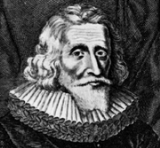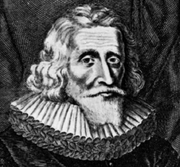
Joachim Jungius
Encyclopedia

Germans
The Germans are a Germanic ethnic group native to Central Europe. The English term Germans has referred to the German-speaking population of the Holy Roman Empire since the Late Middle Ages....
mathematician
Mathematician
A mathematician is a person whose primary area of study is the field of mathematics. Mathematicians are concerned with quantity, structure, space, and change....
, logician and philosopher of sciences.
Life
He was a native of LübeckLübeck
The Hanseatic City of Lübeck is the second-largest city in Schleswig-Holstein, in northern Germany, and one of the major ports of Germany. It was for several centuries the "capital" of the Hanseatic League and, because of its Brick Gothic architectural heritage, is listed by UNESCO as a World...
. He studied metaphysics
Metaphysics
Metaphysics is a branch of philosophy concerned with explaining the fundamental nature of being and the world, although the term is not easily defined. Traditionally, metaphysics attempts to answer two basic questions in the broadest possible terms:...
at the Universities of Rostock
University of Rostock
The University of Rostock is the university of the city Rostock, in the German state of Mecklenburg-Vorpommern.Founded in 1419, it is the oldest and largest university in continental northern Europe and the Baltic Sea area...
and Giessen
University of Giessen
The University of Giessen is officially called the Justus Liebig University Giessen after its most famous faculty member, Justus von Liebig, the founder of modern agricultural chemistry and inventor of artificial fertiliser.-History:The University of Gießen is among the oldest institutions of...
, where he earned in 1608 his degree.
From 1609 to 1614 he was a professor of mathematics at the University of Giessen, and in 1614–15 was involved with studies of educational reform with Wolfgang Ratke
Wolfgang Ratke
Wolfgang Ratke was a German educational reformer.-Early life:...
(1571–1635) and Christoph Helvig
Christoph Helvig
Christoph Helvig was a German chronologist and historian, theologian and linguist.Helvig was born at Sprendlingen. In chronology he generally was a follower of Joseph Scaliger...
(1581–1617). In 1616 he returned to Rostock
Rostock
Rostock -Early history:In the 11th century Polabian Slavs founded a settlement at the Warnow river called Roztoc ; the name Rostock is derived from that designation. The Danish king Valdemar I set the town aflame in 1161.Afterwards the place was settled by German traders...
to study medicine, and in 1619 received his medical doctorate from the University of Padua
University of Padua
The University of Padua is a premier Italian university located in the city of Padua, Italy. The University of Padua was founded in 1222 as a school of law and was one of the most prominent universities in early modern Europe. It is among the earliest universities of the world and the second...
. Afterwards he practiced medicine in Lübeck from 1619 to 1623. In 1622 at Rostock, he founded an early scientific society known as Societas Ereunetica sive Zetetica
From 1624 to 1628 Jungius was a professor of mathematics at Rostock, which was briefly interrupted in 1625 when he spent time as professor of medicine at the University of Helmstedt
University of Helmstedt
The University of Helmstedt, official Latin name: Academia Julia , was a university in Helmstedt in the Duchy of Brunswick-Wolfenbüttel that existed from 1576 until 1810....
. From 1629 until 1657 he was professor of natural sciences at the Akademisches Gymnasium, a secondary school in Hamburg
Hamburg
-History:The first historic name for the city was, according to Claudius Ptolemy's reports, Treva.But the city takes its modern name, Hamburg, from the first permanent building on the site, a castle whose construction was ordered by the Emperor Charlemagne in AD 808...
. Jungius believed that science was based on mathematics, and at Hamburg stressed the importance of critical thinking to his students. He also felt that mathematics and logic
Logic
In philosophy, Logic is the formal systematic study of the principles of valid inference and correct reasoning. Logic is used in most intellectual activities, but is studied primarily in the disciplines of philosophy, mathematics, semantics, and computer science...
served as a remedy to metaphysical
Metaphysics
Metaphysics is a branch of philosophy concerned with explaining the fundamental nature of being and the world, although the term is not easily defined. Traditionally, metaphysics attempts to answer two basic questions in the broadest possible terms:...
and mystical speculation.
Works
Jungius was an important figure of 17th century atomismAtomism
Atomism is a natural philosophy that developed in several ancient traditions. The atomists theorized that the natural world consists of two fundamental parts: indivisible atoms and empty void.According to Aristotle, atoms are indestructible and immutable and there are an infinite variety of shapes...
, and was an advocate of a "corpuscular chemistry
Corpuscularianism
Corpuscularianism is a physical theory that supposed all matter to be composed of minute particles, which became important in the Seventeenth century. Among the leading corpuscularians were Rene Descartes, Robert Boyle, and John Locke....
" that assumed the conservation of mass
Conservation of mass
The law of conservation of mass, also known as the principle of mass/matter conservation, states that the mass of an isolated system will remain constant over time...
. He also demonstrated that a catenary
Catenary
In physics and geometry, the catenary is the curve that an idealised hanging chain or cable assumes when supported at its ends and acted on only by its own weight. The curve is the graph of the hyperbolic cosine function, and has a U-like shape, superficially similar in appearance to a parabola...
was not a parabola
Parabola
In mathematics, the parabola is a conic section, the intersection of a right circular conical surface and a plane parallel to a generating straight line of that surface...
, which was contrary to Galileo's assumption that it was.
In 1638 he published the textbook Logica Hamburgensis, which presented late medieval theories and techniques of logic
Logic
In philosophy, Logic is the formal systematic study of the principles of valid inference and correct reasoning. Logic is used in most intellectual activities, but is studied primarily in the disciplines of philosophy, mathematics, semantics, and computer science...
. Here he demonstrated oblique cases of arguments that did not adhere to simpler forms of inference
Inference
Inference is the act or process of deriving logical conclusions from premises known or assumed to be true. The conclusion drawn is also called an idiomatic. The laws of valid inference are studied in the field of logic.Human inference Inference is the act or process of deriving logical conclusions...
; An example being: "The square of an even number is even; 6 is even; therefore, the square of 6 is even". His double position as connected to scholastic logic, but also to innovations, earns him the classification Semi-Ramist.
Gottfried Wilhelm Leibniz wrote,
- "While Jungius of Lübeck is a man little known even in Germany itself, he was clearly of such judiciousness and such capacity of mind that I know of no other mortal, including even Descartes himself, from whom we could better have expected a great restoration of the sciences, had Jungius been either known or assisted."

